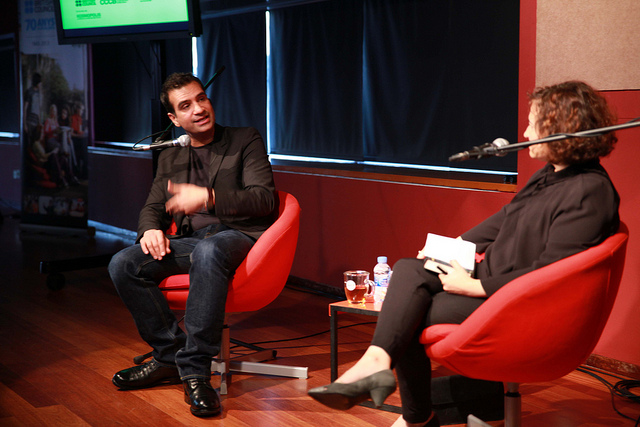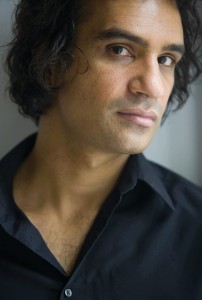 We read novels to have a good time, or to learn more, or for the pleasure of letting ourselves be carried away by a good story, but behind every book there is always an author and a singular writing process, which may be long or short, pleasurable or tortuous, each with its own techniques and dynamics that we are rarely aware of as readers.
We read novels to have a good time, or to learn more, or for the pleasure of letting ourselves be carried away by a good story, but behind every book there is always an author and a singular writing process, which may be long or short, pleasurable or tortuous, each with its own techniques and dynamics that we are rarely aware of as readers.
During his lecture at the CCCB, Nadeem Aslam wanted to share some of the secrets of his writing with us and he talked about his strategies for writing novels and about his beginnings as a writer. His are tips will be interesting for everyone who writes, but also for lovers of literature in general and for readers of The Blind Man’s Garden (in Spanish: El jardín del hombre ciego - Mondadori, 2013), his latest novel.
In this first fragment, Aslam explains the importance that notebooks have for him in his writing process. (You can hear this on the lecture video, minute 33:55)
Since about the age of 20, I have kept a notebook, in which I write down everything that I find interesting. It might be a comment of yours, a play of light on a blossom, a quote from a book, something I saw on the street… Now I have more than 100 notebooks. When I work, I sit down and write a chapter, then completely at random, I pick up one of these 100 notebooks, and look at the first thing that I wrote down. It might be a notebook from when I was 25, or 37, or 41, or from yesterday. Then I say: ‘Can I find a place for it here, in this chapter?’ If I can use it, I write it down, then I mark it with a small cross so that I do not use it again. Then I move on to the second thing, then the third, and I follow this process and go through the entire notebook. By the end of the day, the entire page will be scrawled with small notes and ideas that I will add to the text. Later when I edit it if I think it doesn’t work, I take it out and put it back in the notebook, because it is not a bad thought, it just doesn’t belong here; I know I will find a place for it somewhere else, maybe tomorrow or maybe in fifteen years time, or thirty. [...] In a longer chapter I can go through four, five or six notebooks, so on a purely practical level, I have been writing this book since I was 20, because there are thoughts in here from when I was 20… Apart from the notebooks, I am also a human being; I have a mother, a father, nephews, girlfriends… Those experiences then come in, because my first point of reference is always my own life. I may change things slightly to fit the needs of the narrative, of course, but if I am going to have a mother in my novel, my first reference will be my own mother.
The way in which Nadeem Aslam learned literary English also merits attention. The writer’s family went as refugees to Britain when he was 14 years old, and to resolve the problems with the language he read the great novelists, to the point where he even copied their works by hand (minute 41:40 of the lecture).
In Pakistan we were not rich; we were people of the left. If you are rich in Pakistan, you can send your children to expensive schools where they teach you in English, but I had gone to a government school where I was taught in Urdu, so when I came to Britain at the age of 14, I had very basic English, such as ‘This is a table; that is a floor’. At school in England the subjects that I did well in were sciences, because for sciences your English didn’t need to be good, you had to assimilate facts and reproduce them, if they happen to be in bad English it doesn’t really matter. But the subjects I was interested in, literature, history, politics and philosophy, for all of these you needed to write essays, argue with people, articulate yourself, and I couldn’t even write a paragraph. I went to university to read sciences, but in the third year, when I had been living in Britain for seven years, I said to myself my English is not good enough to do what I really wanted to do, which was to write. [...] Because I could not study the subjects that I liked at high school and at university, or take a B.A. or an M.A. or a PhD, I said to myself over the next ten years I’m going to do that. I would go to one person and say ‘Tell me who is a great writer’ and they would say ‘Thomas Hardy’, so I went and ready everything by Thomas Hardy, from the first novel to the last. Then I would go to person B and way ‘Who is a great writer’ and they would say ‘Nabokov’, so I would read everything by Nabokov. They said Faulkner, Joyce, Conrad, Lawrence; I read them all… Then I wanted to find out: What is a paragraph? How many thoughts are allowed on a page? What is a comma? What is a full stop used for? So I copied out the whole of Moby Dick by hand. Then I copied out As I lay dying by William Faulkner, The Street of Crocodiles by Bruno Schulz, Beloved by Toni Morrison, The Autumn of The Patriarch by Gabriel García Marquez, Lolita by Nabokov, Black Meridian by Cormac McCarthy… I still have those pages, it was before the typewriter, I was doing them by hand. So it was very important for me to do that.
Next speaker: British writer Philip Hensher
Nadeem Aslam’s visit to Barcelona formed part of the cycle “Llocs/Lugares/Places. Dialogues with British writers” organised in collaboration with the British Council as part of the events associated with Kosmopolis, and other writers taking part are Philip Hensher, who will be visiting the CCCB on 8 October, and Edward St. Aubyn, who will visit us on 12 November 2013.









